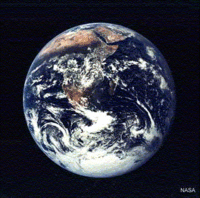For the final essay in the e-mail version of A-Clue.Com, which is being sent to over 1,000 subscribers, I talked a little about the Internet’s future, and its importance.
Enjoy.

Something that sets my teeth on edge is any reference to what the Internet is doing" or where the Internet is going.
The Internet isn’t doing anything, and isn’t going anywhere. It is a protocol, a way to connect computers together. It’s a voluntary technical agreement.
When they make this reference, people are usually talking about HTTP, the HyperText Transfer Protocol first unveiled by Tim Berners-Lee in 1989. They may be talking about the Internet address space, or its naming conventions, or some technology like AJAX that makes the Internet more efficient. Or they may be talking about some other new technology, like video over IP, that runs on the Internet Protocol.
That would make sense.
When it gets crazy is when they start talking about social networking, or blogging, or TV clips, as what the Internet is doing. (Time Magazine just did that in naming no one in particular as its Person of the Year.) These are just services that ride on the IP backbone. They’re not the Internet. The people who use the Internet, who feed it material and download that information, they are doing something. The Internet? Not so much.
IP itself is nearly 40 years old, and it should change. A new version
of the numbering conventions, IPv6, has been around for nearly a decade
now. It promises to give every device its own IP address, and eliminate
the technical bias of Ipv4, which reserved most addresses to the U.S.
and Western Europe, where most computers were when the protocol was
formulated. Local language naming spaces would be another welcome
improvement, so long as we have reliable translation between those
domains. That’s a technical challenge I hope will be tackled soon.
The slow uptake of Ipv6 and of other Internet innovations, like the
World of Always On, comes down to something that was seemingly (and
without intent) built into the Internet’s DNA. That is, a suspicion of
government. And the bigger the government the greater the suspicion.
Thus to many governments the Internet has become a law-free zone,
therefore suspect, therefore something they must seek to control. This
is a worldwide phenomenon. Since 9/11 the U.S. Government has become as
anxious to control what people do online as anyone else. From its
collection of everyone’s online records to its ban on Internet gambling
to its approval of dinosaur-like monopolies to recent calls for an Internet Sedition law, or the registration of blog content, it seems the entire Republican Party, which still dominates our politics, has become a giant House of Lud.
Thanks to both business and government monopolies, the pace of online
innovation has slowed in recent years. The financial excitement over
so-called "Web 2.0" companies is a pale imitation of what went on a
decade ago concerning the original Web. The financial hits of this
decade — Google, MySpace, Apple — seem to be all-or-nothing affairs,
near monopolies that control, thus monetize, types of Internet activity
that used to be open to free competition.
People have a natural distrust of big businesses and big government.
This existed before the Internet. And when such institutions become
rapacious, people shy away. Who wants to put their heart or sugar
records online, who wants to put the status of their lights and home
alarms and home temperature online where Big Brother might get at it,
or where Little Brother might find it and abuse it? If a crook can find
out you’re keeping the house cold, and that a program is running the
lights, they know not to fear those lights, come on in and take all our
shiny stuff. If they know where you are medically vulnerable, they can
take advantage of that as well.
But we are entering an age where all such protests — whether by
government, business, cons or consumers — will no longer suffice.
There are crises before us against which the Internet’s technology must
be deployed, lest we and the world die.
I’m talking here of the twin crises of global warming and aging.
The possible death of the world will require all our energies to turn
around. We must not only find non-hydrocarbon energy, and a new system
for distributing it, but we have to solve the problems of world
poverty, lest the poor destroy the world for short-term survival.
The aging of the West — not just here in the U.S., but throughout
Western Europe and East Asia — also requires the Internet’s advance to
deal with. Nearly the entire planet is now reproducing at less than a
replacement rate, so nearly the entire planet is now aging. Weaker
eyes, weaker hearts, weaker minds, weaker bodies, decay and death await
all of us. There will be fewer-and-fewer caregivers as time goes on. We
must automate, we must age in place, and we must age more slowly,
maintaining what remains of our intellectual power and advancing it.
There is no longer a choice. That is the message of this time, the
crisis no political party has yet come to grips with, and few
"thinkers" have yet addressed.
The Internet is becoming the hive mind that will address these
problems. All our knowledge, all our intellect, and all our machines
can use these protocols to address personal, local, national and
worldwide life-and-death crises that are coming on us thick and fast.
You think the Internet’s something now?
You ain’t seen nothing yet.













